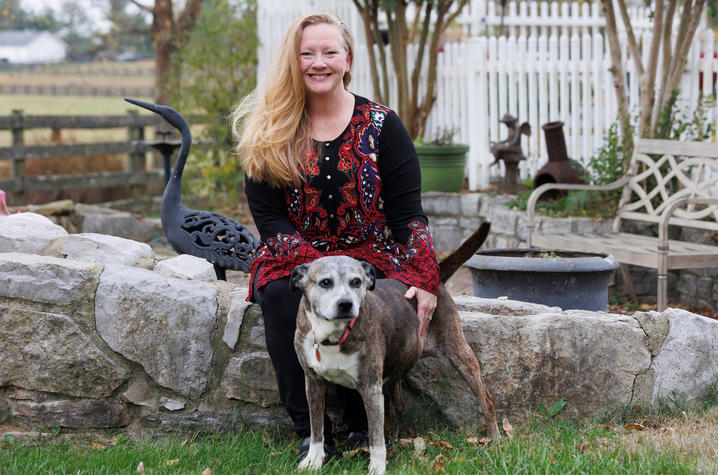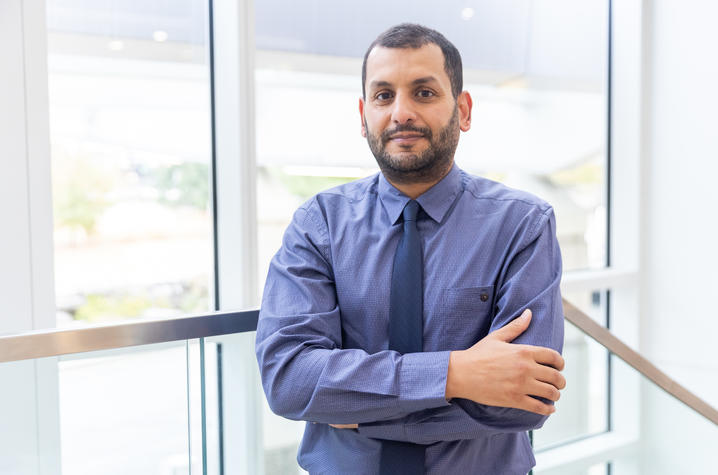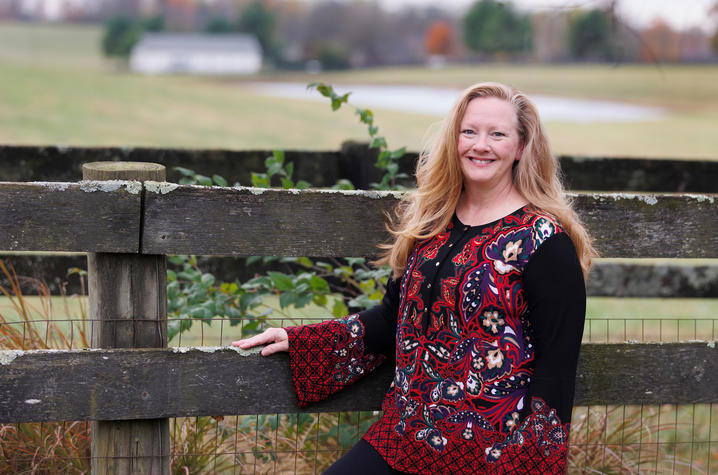Patient finds answers and hope thanks to dedicated UK neurology team
LEXINGTON, Ky. (Jan. 4, 2024) — “I went from being an extremely active person to spending all my time lying on my couch or in bed. I became an invalid, dependent on my husband for everything.” That is how Tina Frazier describes what life was like in the fall of 2022.
She found herself in this state after what all started as tremors in her legs that she could feel but could not see from the outside. Frazier sought medical care and was prescribed various medications, however, received zero answers about what was going on. The tremors eventually spread to her entire body and her condition steadily worsened. This all also led to insomnia and Frazier was only getting a few hours of sleep each week.
“It just exacerbated my condition, and I didn’t know how I was going to survive this situation,” said Frazier. “I was sure I was going to die or be stuck like this forever.”
Desperate for some relief and answers, Frazier and her husband came to the emergency department at University of Kentucky Albert B. Chandler Hospital. It was that November evening Frazier says her story took a much-needed turn as she met Omar Al-Janabi, M.D., Ph.D.
“I still get emotional when I recall that meeting,” said Frazier. “Although I was in a panicked state, scared and desperate – he was calm, caring, and genuinely concerned about me.”
Frazier remembers Al-Janabi, who at the time was a senior neurology resident in the UK College of Medicine, telling her that he was determined to find some answers. “He told me he would figure it out, and you know, I just really felt that he would. It gave me this confidence that I finally found someone who was going to help me through this.”
Frazier and Al-Janabi both knew the answers might not be immediate but were committed to working together through this tough chapter.
“She was in great distress, and so was her husband. They had been dealing with this for some time and were feeling hopeless,” said Al-Janabi. He discussed this all with his attending physician on call, who just so happened to be a movement disorder specialist with UK HealthCare’s Kentucky Neuroscience Institute (KNI). “I talked through it with Dr. Tarek Ali and we decided to switch her to a different medication that helps with tremors based on her previous workups and diagnosis of essential tremors from previous doctors.”
With a game plan in place to try the new medication for a few weeks, Frazier was scheduled for follow-ups in the resident continuity clinic which sometimes can offer earlier availability than the specialty clinic for movement disorders. “If we think a patient needs to be seen sooner rather than later, this is a great option,” said Al-Janabi.
Frazier returned for her follow-up about three weeks later still having the same symptoms and her insomnia worsening. There were some other adjustments to medications made throughout the next few weeks, but still no improvement or a response at all to the treatments.
“I learned from my mentors that to be a good physician is to be a good listener,” said Al-Janabi.
Al-Janabi asked Frazier to walk him through her story from the beginning again and give detailed descriptions of all her symptoms. “Her symptoms were worse when she was static,” said Al-Janabi. “She said she didn’t feel stable or balanced when she was still. She also kept describing a feeling of vibration inside.”
In January of 2023, the neurology resident was able to finally find an accurate diagnosis for Frazier. Something many other doctors were unable to do. The final answer for what she was experiencing – a rare vestibular disorder – Mal de débarquement syndrome (MdDS).
MdDS is common after traveling, especially by boat. It causes issues with the perception of motion and causes those experiencing it to feel restless or like they are moving when they are actually sitting still or lying down.
Frazier had not been on a boat and did not have a known trigger – which can happen in rare cases.
“I was skeptical at first because I had been misdiagnosed a few times during this ordeal … but I really trusted him,” said Frazier.
The condition is one that doesn’t have any known medications, however, there is specific physical therapy used to treat this syndrome and other vestibular disorders.
“I think because our team worked so closely with her since her initial visit and we communicated with her on-the-go constantly throughout the ordeal … she really trusted our team. When we eventually got to this diagnosis and a simple but life-changing treatment plan she was willing to try it. I’m so glad she did,” remembered Al-Janabi.
“I figured we’d see what happens and at that point, I’d much prefer trying therapy over another drug,” said Frazier.
Frazier stopped taking medication for tremors and started physical therapy with a vestibular specialist. She began seeing results in just a few weeks.
“This time last year I didn’t know what was going to happen. I couldn’t even hold the phone to talk to my sister. I couldn’t hold a book to read. I couldn’t work on jigsaw puzzles. I couldn’t take care of my garden or koi pond.” said Frazier.
Months of hard work at physical therapy proved to be worth it and further confirmed the diagnosis made by Dr. Al-Janabi. “When I started therapy, I could barely make the five-minute drive to my therapist’s office. This September, I was able to drive two and a half hours to visit my sisters and celebrate my little sister’s birthday,” said Frazier.
With her active lifestyle now back, Frazier says she truly feels none of this would be possible if Dr. Al-Janabi had not come into her life and put her on the road to recovery.
“It was wonderful to be able to decorate for Christmas this year. Last year, my husband put our tree up and I would get up and put five ornaments on and then I would have to lie back down,” said Frazier.
A feeling of gratitude this holiday season is something that is actually felt twofold when recalling her story. That is because, as the team at KNI worked to find the root cause of her tremors, they discovered a brain aneurysm. Just a month after her diagnosis of MdDS, Frazier underwent surgery to repair the aneurysm.
“Through this all, I have to be thankful for the tremors and all I endured, because those probably saved my life. The doctors were able to find and fix the brain aneurysm before it ruptured,” said Frazier.
It has been a long, unexpected path but it is one Frazier is now thankful for and that includes each twist and turn it took for her to get to Dr. Al-Janabi and KNI. Frazier is continuing physical therapy but says her tremors are barely noticeable most days. “I’m finally at a point where I am confident I am going to overcome this all.”
UK HealthCare is the hospitals and clinics of the University of Kentucky. But it is so much more. It is more than 10,000 dedicated health care professionals committed to providing advanced subspecialty care for the most critically injured and ill patients from the Commonwealth and beyond. It also is the home of the state’s only National Cancer Institute (NCI)-designated Comprehensive Cancer Center, a Level IV Neonatal Intensive Care Unit that cares for the tiniest and sickest newborns and the region’s only Level 1 trauma center.
As an academic research institution, we are continuously pursuing the next generation of cures, treatments, protocols and policies. Our discoveries have the potential to change what’s medically possible within our lifetimes. Our educators and thought leaders are transforming the health care landscape as our six health professions colleges teach the next generation of doctors, nurses, pharmacists and other health care professionals, spreading the highest standards of care. UK HealthCare is the power of advanced medicine committed to creating a healthier Kentucky, now and for generations to come.







